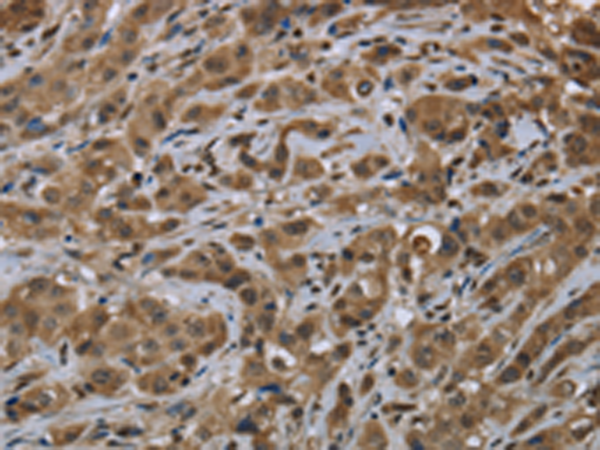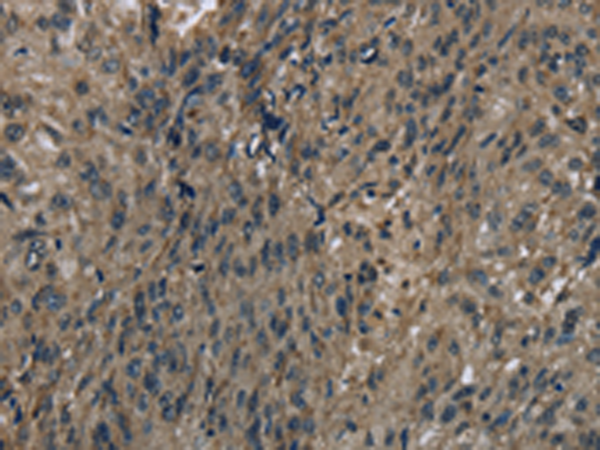


| WB | 咨询技术 | Human,Mouse,Rat |
| IF | 咨询技术 | Human,Mouse,Rat |
| IHC | 1/100-1/300 | Human,Mouse,Rat |
| ICC | 技术咨询 | Human,Mouse,Rat |
| FCM | 咨询技术 | Human,Mouse,Rat |
| Elisa | 1/2000-1/5000 | Human,Mouse,Rat |
| Aliases | ALKBH9 |
| WB Predicted band size | 58 kDa |
| Host/Isotype | Rabbit IgG |
| Antibody Type | Primary antibody |
| Storage | Store at 4°C short term. Aliquot and store at -20°C long term. Avoid freeze/thaw cycles. |
| Species Reactivity | Human |
| Immunogen | Fusion protein of human FTO |
| Formulation | Purified antibody in PBS with 0.05% sodium azide and 50% glycerol. |
+ +
以下是关于FTO抗体的3篇参考文献(示例为虚构内容,仅供参考格式):
1. **文献名称**:*FTO Antibody Validation in Mammalian Tissues*
**作者**:Smith J, et al.
**摘要**:该研究验证了FTO抗体在小鼠脑组织和脂肪细胞中的特异性,通过Western blot和免疫组化证实抗体可有效识别FTO蛋白,并发现其表达水平与肥胖表型相关。
2. **文献名称**:*Role of FTO in RNA Demethylation: Insights from Antibody-Based Assays*
**作者**:Lee H, et al.
**摘要**:利用FTO特异性抗体结合免疫沉淀技术,揭示了FTO蛋白通过去甲基化修饰调控mRNA稳定性,并验证了抗体在HEK293细胞模型中的应用。
3. **文献名称**:*Commercial FTO Antibodies: A Comparative Study*
**作者**:Chen R, et al.
**摘要**:对比分析了市售5种FTO抗体的灵敏度和特异性,发现Abcam和CST的抗体在低表达组织中表现最优,为实验选择提供参考。
*注:以上文献为示例,实际引用需检索PubMed等数据库获取真实文献。建议使用关键词“FTO antibody validation”或“FTO protein detection”进行筛选。*
The FTO (fat mass and obesity-associated) antibody is a critical tool for studying the FTO protein, an enzyme encoded by the *FTO* gene located on human chromosome 16. First linked to obesity through genome-wide association studies, FTO gained prominence for its role in regulating energy homeostasis, metabolism, and adipogenesis. Structurally, FTO functions as an RNA demethylase, primarily targeting N6-methyladenosine (m6A) and other RNA modifications, influencing mRNA splicing, stability, and translation. Its involvement in epigenetic regulation connects it to diverse physiological processes and diseases, including obesity, diabetes, cancer, and neurological disorders.
FTO antibodies are widely used in techniques like Western blotting, immunohistochemistry, and immunoprecipitation to detect protein expression, localization, and interactions. Researchers rely on these antibodies to explore tissue-specific FTO expression patterns, its dysregulation in metabolic syndromes, and its oncogenic or tumor-suppressive roles in different cancers. Validating antibody specificity is crucial, often achieved via knockout cell lines or siRNA-mediated FTO knockdown. Commercial FTO antibodies are typically raised against specific epitopes (e.g., human FTO amino acid residues 300-500) and vary in host species (rabbit, mouse) or conjugate tags (e.g., HRP, fluorescent labels). Challenges include cross-reactivity with homologous proteins (e.g., ALKBH5) and ensuring consistent performance across experimental models. As interest in RNA epigenetics grows, FTO antibodies remain indispensable for unraveling its molecular mechanisms and therapeutic potential.
×